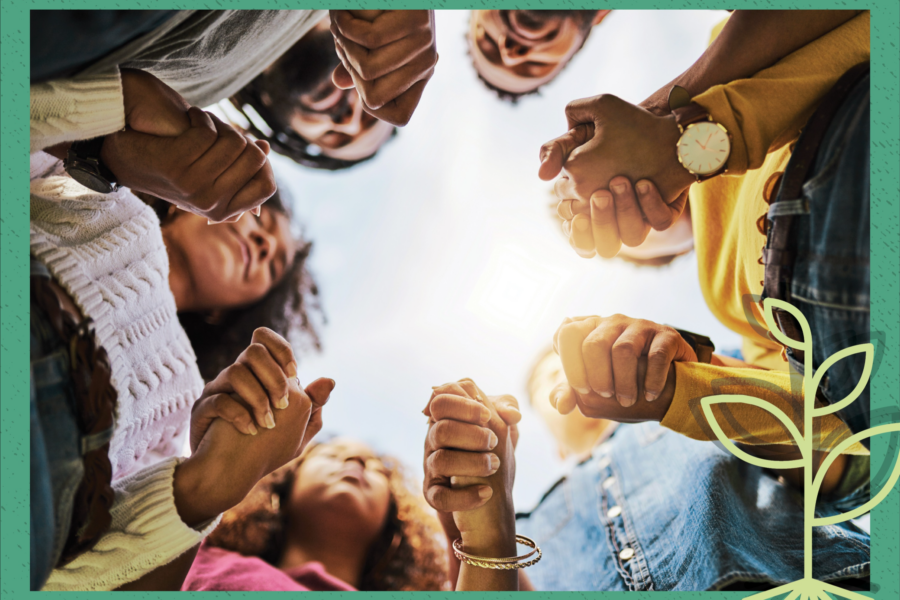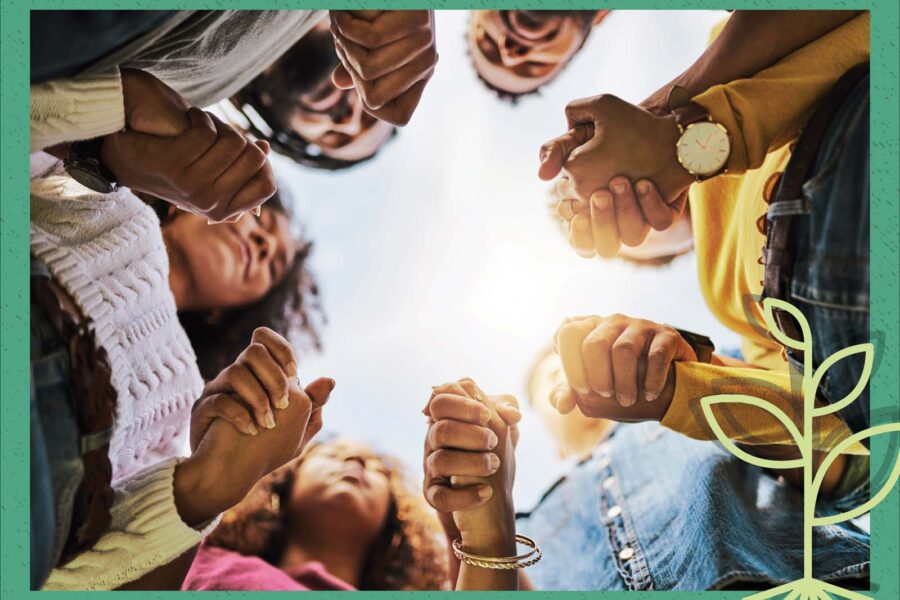Access to mental health care should be a right, not a privilege. In this Big Idea episode, we take a look back at conversations with mental health professionals at Antioch, and how they have used their work to address social injustices in our society. Whether it is helping us confront our unconscious biases, advocating for culturally responsive therapy practices, or creating more accessibility to these professions, Antiochians are continuing to break boundaries and push their field in the direction of justice.
Subscribe: Apple Podcasts | Spotify | Stitcher | Google | Simplecast
Transcript for “Big Idea: Mental Health Justice at Antioch”
[music]
[00:00:04] Lauren Instenes: Welcome to The Seed Field Podcast, the show where Antiochians share their knowledge, tell their stories, and come together to win victories for humanity.
[music]
I am your guest host today, Lauren Instenes. I am normally behind the scenes editing each episode, but in this minisode, I’m going to lead us on a journey back into the podcast archives from this season. I hope you’ll join me as we take a closer look at our focus on mental health at Antioch University.
At the core of Antioch’s mission is the idea of serving our communities and working to win victories for humanity. I think one of the most service-oriented careers in the world is that of a mental health professional. Every day they strive to help their clients and communities heal and grow, helping us to become the best versions of ourselves.
Unsurprisingly, as the goals of these professions align so well with Antioch’s mission, we have a long history of training mental health practitioners. As early as 1982, Antioch’s first doctoral program in clinical psychology was founded on New England’s campus. Today, Antioch offers over three dozen programs in counseling, therapy, and psychology. New programs are continuing to be developed all the time.
This season of The Seed Field Podcast, we interviewed counselors, therapists, and psychologists. As I was doing research for this episode, I started to ask the question, what’s the difference between these professions? Is there one? I thought that might be a good place to start. The key distinction is the level of education. Counselors and therapists have Masters or Doctorates while psychologists must have a Doctorate.
There are other distinctions in the profession’s theory and history, but in practice, they all perform similar services. Some say that counselors and therapists will focus more on the day-to-day side of mental health, helping the client figure out how they can sustain better mental health in their everyday lives. While psychologists focus more on underlying issues and past experiences. However, this very much depends on their own personal training and philosophy.
Here’s where I think it can be useful to hear how specific professionals describe their own practice. Let’s first listen to how Mariaimeé Gonzalez, a counselor from our Seattle campus explains her work.
[music]
[00:02:24] Mariaimeé Gonzalez: Then we want the client to be the expert of how they are defining their own cultural wellness in that particular journey, and being thoughtful and honoring that throughout that experience as mental health professionals, and working through it with a social justice lens on a micro, meso, and macro level.
Honoring the oppressive systems that might impact that individual, but also how would they like to do their own liberation work and their journey as a client with the particular counselor in a collaborative relationship.
[music]
[00:02:58] Lauren Instenes: Here’s Monique Bowen, a psychologist from our New England campus describing her work.
[music]
[00:03:04] Monique Bowen: I think probably the most helpful understanding of psychoanalysis, I think, has to do on an insistence on seeking, and seeking that which isn’t known, and the transformational power that can come from discovery. That insistence, that work of understanding our own journey, our mutual journeys with others, and as a culture, society, a people. There’s so many areas of research and discipline that look at aspects of communication.
Within psychoanalysis, the way that we explore that communication is multi-determined, but at the base idea of it is to reach a place of a deeper knowledge that comes from the things that we’re not thinking about, that are not top of mind.
[music]
[00:04:14] Lauren Instenes: We also interviewed two art therapists, Beth Donahue and Amy Morrison, who recently started a brand new online art therapy program at Antioch. Their program is part of the clinical mental health counseling program, so these students could classify themselves as therapists or counselors. However, art therapy itself is a unique practice with its own certification and professional standards.
In this next clip, Beth explains how this type of therapy can be extremely useful in situations where other therapies aren’t working.
[music]
[00:04:46] Beth Donahue: We actually know that some traumas are actually not even stored in the same part of the brain that language is, so it’s not actually even possible to make that connection in the brain and have words for what has happened to you, but you can. It is stored in where our symbolic language is stored. If you are trying to process a trauma, if you are trying to explain what has happened to you to someone else, and there are no words, there is no way to access that through language, but you can put something on a piece of paper. You can put some symbols, and some lines, and some shapes down on a piece of paper that represents what happened to you.
Not only does that help you to communicate your experience to the art therapist, it also gets that memory outside of you and onto a surface that you can then reflect on, that you can get some distance from, that you can put aside if you need to, and then bring out again when you’re ready. Artmaking not only helps us access the information that we need to process a trauma, it also helps us communicate that to someone else. Both things we see as therapeutic and necessary.
[music]
[00:06:11] Lauren Instenes: Art therapy can be used for so much more than accessing trauma. It can also be an extremely accessible form of therapy for children or those who use nonverbal communication. One of the things that I like most about Antioch is the way that all of the programs infuse social justice into their curriculum. This emphasis on social justice came up differently for every person we interviewed.
For example, Maria just recently co-founded the Latinx Mental Health & Social Justice Institute at Antioch.
[music]
[00:06:43] Mariaimeé Gonzalez: We hope with the institute to expand on that where we’ll have continued education which we have started, where we have workshops, where we have speakers come in from the Latinx community to talk about ways that they have worked with clients and advocacy. We’re looking at research opportunities.
We’re looking at global engagement, partnering with other institutions in Latin America, where students can have the opportunity to travel and work in those particular countries to do different kinds of service or training projects.
Then also partnering with other disciplines on social justice projects, where really, we can all learn from one another in our disciplines. We all have gifts to bring. How do we work together with those gifts to strengthen and evolve the work that we can do with Latinx communities?
[music]
[00:07:41] Lauren Instenes: Likewise, Amy and Beth are working hard to ensure that their new program is using diverse materials and that it is accessible to a wide range of students. Here’s Beth and then Amy describing those efforts.
[music]
[00:07:55] Beth Donahue: We expanded our definition of graduate school material to include not just peer-reviewed articles and textbooks, which are important parts, but also those leave out a lot of very important voices that are talking about things that we want our students to learn about, and things that we, Amy and I also want to learn about. We include vlogs, and blogs, and social media posts, TikToks, and Instagram.
We want to make sure that we are giving a place for the voices of people who are talking about the issues that are important to our students. Those things are all included in our classroom experiences as well.
[music]
[00:08:34] Amy Morrison: We’re thinking about whose voices we’re including. We’re asking ourselves about what voices are missing. Even before that, choosing to have a program online is a socially just decision. In that people don’t actually have to move to New England, which is an extremely expensive place to live, and people don’t have to move to Seattle or the West Coast.
Really, with this online platform, the way that we can open up our programming and training of our therapists is expansive.
[music]
[00:09:13] Lauren Instenes: This mission of making a transformative education available to more people and communities really embodies Antioch’s history and mission, but another side of that mission is to use the techniques we study to bring greater justice to the world. Monique is doing just that, focusing her research on how we can use psychoanalysis to better understand and heal communities with large divides.
[music]
[00:09:39] Monique Bowen: The reason I’m interested and have been interested in the application of psychoanalytic ideas to the problems I see and that we all are experiencing is that it’s that same sense of not looking at a problem, that is exactly why we should use these techniques to explore this problem.
It is made from the willing and willful lack of exploration and lack of naming in a fully aware way the power of the relationship to heal the relationship that’s been formed based on power differential, the relationship that’s been formed around race, and other aspects of identity that should be contested in the therapy space are opportunities for people to actually engage with another person subjectivity and make meaning where these things can be contested, with the understanding that it’s occurring within a space that can hold it.
[music]
[00:11:01] Lauren Instenes: Across these interviews with Antioch professors, it’s clear that they all understand that you can’t talk about mental health without talking about community, culture, biases, and oppression. Through their work, they are planting seeds to create an accessible and culturally responsive mental health field, starting right here at Antioch.
You can find links to the three episodes referenced in this recap in the show notes. We post the show notes on our website, theseedfield.org, where you’ll find full episode transcripts, prior episodes, and more. The Seed Field Podcast is produced by Antioch University and hosted by Jasper Nighthawk. A special thanks to Karen Hamilton and Melinda Garland.
Thank you for spending your time with us today. That’s it for this episode, we hope to see you next time. Don’t forget to plant a seed, sow a cause, and win a victory for Phumanity. From Antioch University, this has been The Seed Field Podcast.
[music]
[00:12:20] [END OF AUDIO]



